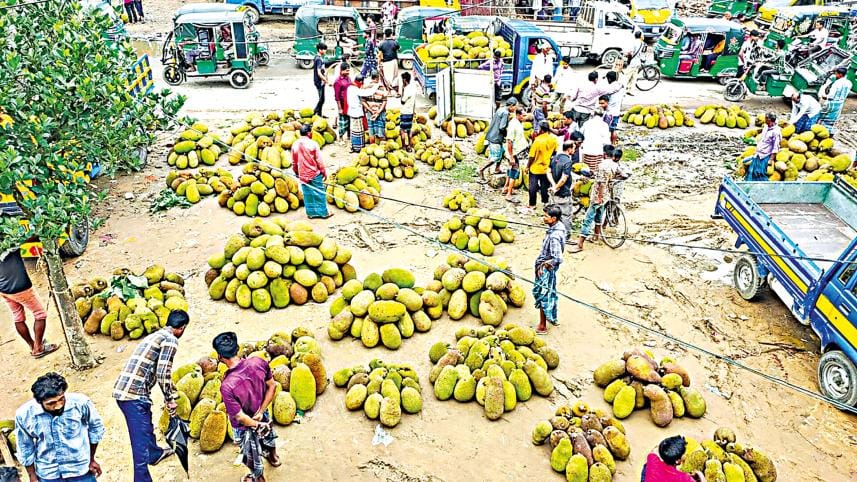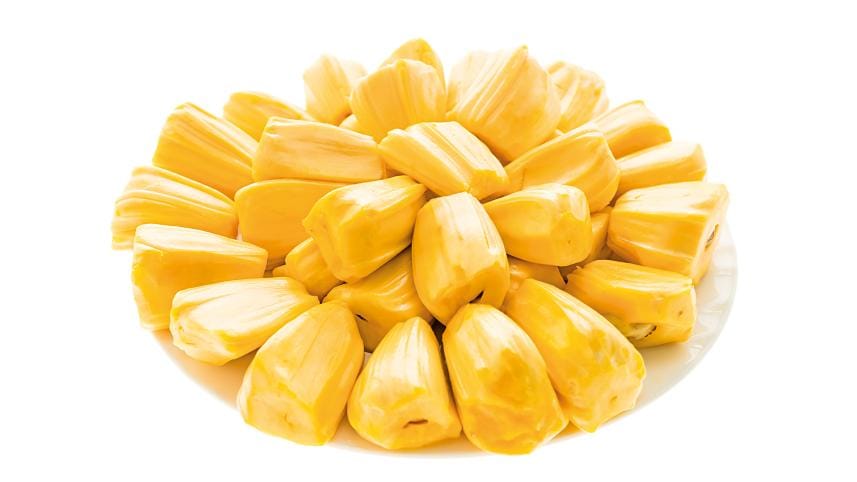Jackfruit: Bangladesh’s forgotten superfruit

Every summer in Bangladesh, thousands of tonnes of ripe jackfruit rot under trees—unpicked, unsold, and ultimately discarded. Despite being our national fruit and a recognised superfood, jackfruit remains a vastly underutilised resource in our food system. This is not just food waste; it is a lost opportunity for nutrition, enterprise, and national pride.
Jackfruit lives up to its "superfruit" label with remarkable nutritional credentials: rich in fibre, vitamin C, potassium, and antioxidants. Green jackfruit is now used globally as a plant-based meat substitute, while the ripe fruit is a sweet, energising treat. In many Bangladeshi homes, particularly in rural areas, jackfruit buds are mashed or mixed with salt and chilli powder to create a simple yet flavourful snack—one that evokes nostalgia and childhood memories for many. Every part of the fruit is usable—seeds can be milled into flour, the rinds used as livestock feed, and the fibrous pulp processed into natural sugar. Even jackfruit leaves are sometimes used for packaging or decorative food presentation.
Yet in Bangladesh, nearly 45 per cent of our jackfruit harvest—about 500,000 tonnes—goes to waste annually due to poor storage and processing infrastructure, according to a 2023 report. This is a staggering figure in a country facing rising food insecurity and economic stress.

Why aren't we seeing the value?
Part of the problem stems from a deeply ingrained mindset. Many Bangladeshis instinctively regard foreign products as superior, while undervaluing what is grown at home. This attitude—shaped by our colonial legacy and reinforced by the forces of globalisation—has gradually shifted food preferences away from traditional produce like jackfruit.
Scholars note that formerly colonised societies often internalise a sense of inferiority towards their own traditions and resources. In Bangladesh, this is clearly reflected in our treatment of food heritage: fruits such as apples or grapes are celebrated as symbols of aspiration, while jackfruit is too often dismissed as outdated, messy, or inconvenient.
Urbanisation has only deepened this disconnect. For many younger Bangladeshis, jackfruit is messy, difficult to eat, or simply outdated. They often gravitate towards packaged imports—perceived as more modern—despite their lower nutritional value. This perception gap has created a market disconnect that disadvantages rural farmers and domestic producers.
From neglect to innovation
Jackfruit's versatility makes it a prime candidate for food innovation. Young jackfruit can be canned, vacuum-sealed, or frozen for global export as a plant-based meat substitute or vegetable ingredient. Seeds can be roasted into snacks or ground into gluten-free flour for baking. The ripe pulp can be turned into spreads, dehydrated into chewy fruit strips or crunchy fruit chips. Moreover, the fibrous parts of the fruit that are typically discarded can be used to extract natural fruit sugar, which can serve as an industrial input in confectionery or beverage production. Even small-scale food processors can experiment with products—such as jackfruit pulp fruit leather, dehydrated chips, jackfruit-flavoured ice cream, or spiced seed snacks—that align more closely with local taste and culinary traditions.
In rural Bangladesh, jackfruit trees are plentiful but often overlooked for anything beyond personal consumption. Unlocking commercial value requires investment—not just in trees, but in the ecosystem around them.
To achieve this, we must support the micro, small, and medium enterprises (MSMEs) working in food processing. Policy support and investment are crucial. Farmers and small processors need training in post-harvest handling, access to modern drying and storage technologies, and tax incentives to innovate.

Countries such as Thailand offer valuable lessons. Its One Tambon One Product (OTOP) programme supports local entrepreneurs in rural areas, helping transform fruits like durian, mangosteen, and jackfruit into international exports. In 2022, Thailand's fruit exports reached USD 5.88 billion, with processed jackfruit gaining a growing share.
Malaysia has tapped into the Chinese market with premium durian and jackfruit exports, creating distinct branding for local varieties. Vietnam, meanwhile, has heavily invested in fresh jackfruit exports—becoming one of the top suppliers to East Asian markets. All three nations provide models of how coordinated marketing, rural entrepreneurship, and infrastructure investment can elevate a humble fruit into a high-value product.
We can do the same
Bangladesh does not lack potential. What we lack is a clear strategy to elevate jackfruit from a seasonal delicacy to a year-round economic asset.
The government can lead the way by:
• Providing training on post-harvest storage and processing, especially in district-level towns and rural areas.
• Subsidising rural infrastructure such as cold storage, drying units, and food-safe packaging systems.
• Offering tax incentives and soft loans for MSMEs investing in jackfruit-based products, particularly start-ups working on healthy food innovations.
• Promoting jackfruit through national campaigns as a nutritious and heritage-rich product.
• Creating public-private partnerships to pilot jackfruit processing hubs in high-yield areas.
Jackfruit is not just a fruit—it is resilience, nutrition, and enterprise on a branch. Let us give our national fruit the future it deserves.
Sajedul Hoq is a development practitioner and founder of Fusion Terminal, a food processing venture in Bangladesh.



 For all latest news, follow The Daily Star's Google News channel.
For all latest news, follow The Daily Star's Google News channel.
Comments